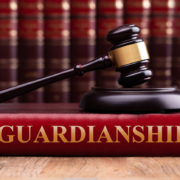Understanding Guardianship in Orlando and Throughout Orange County, Florida
Orlando is a dynamic city with families and individuals facing complex legal matters, including guardianship. Whether it’s caring for an adult child with special needs, an aging parent, or an individual unable to manage their affairs, guardianship plays a critical role in protecting vulnerable individuals. However, the legal process of establishing guardianship in Florida is structured and requires strict adherence to the law.
I’m Beryl Thompson-McClary, an Orlando Guardianship Attorney who handles guardianship matters across Orange County, Florida. If you need guidance on seeking or contesting a guardianship, I can help. Call me today at 1-888-640-2999 to schedule a consultation.
What Is Guardianship in Florida?
Guardianship is a legal process that appoints an individual (the guardian) to make decisions on behalf of another person (the ward) who is unable to manage personal, medical, or financial affairs. This process is governed by Florida Statutes Chapter 744, which outlines the legal framework, rights of the ward, and duties of the guardian.
Guardianship may be sought for:
- Minors: If a child’s parents are deceased or incapacitated.
- Adults with Special Needs: Individuals with developmental disabilities requiring continued assistance.
- Elderly Individuals: Adults with dementia or cognitive impairments who cannot manage their affairs.
- Incapacitated Adults: Those facing medical or mental conditions preventing independent decision-making.
If you are considering guardianship for a loved one, contact me at 1-888-640-2999 to discuss the legal options available.
The Legal Process of Establishing Guardianship in Florida
The guardianship process is structured to ensure protection while preventing unnecessary removal of personal rights. Below is an overview of the legal steps required in Florida:
Step 1: Filing a Petition for Guardianship
The process begins with filing a Petition to Determine Incapacity and a Petition for Appointment of Guardian in the circuit court. The petition must detail:
- The reasons for seeking guardianship.
- The proposed ward’s condition affecting their ability to manage their affairs.
- Information about the petitioner and why they are qualified to serve as a guardian.
Step 2: Court-Appointed Examining Committee
Once the petition is filed, the court appoints a three-member examining committee, typically consisting of:
- A physician.
- A psychologist or another medical professional.
- A layperson with expertise in evaluating incapacity.
This committee assesses the individual’s ability to manage their personal and financial affairs. The committee submits a written report with recommendations to the court.
Step 3: Court Hearing to Determine Incapacity
The court reviews the reports, hears testimony, and determines if the individual is legally incapacitated. If the court finds incapacity, it proceeds with appointing a guardian.
Step 4: Appointment of a Guardian
If guardianship is necessary, the court appoints a suitable guardian, considering factors such as:
- Relationship to the ward.
- Ability to act in the ward’s best interests.
- Absence of conflicts of interest.
The guardian must take an Oath of Office, post a bond (if required), and attend an educational course on guardianship duties.
Step 5: Guardian Responsibilities and Reporting Requirements
Guardians must act in the best interests of the ward and comply with legal reporting obligations, including:
- Initial Guardianship Plan: A detailed plan outlining how the guardian will care for the ward.
- Annual Reports: Financial and well-being reports submitted to the court.
- Accounting of Assets: If managing finances, guardians must keep records and seek court approval for major transactions.
As an Orlando Guardianship Attorney, I ensure that guardians follow all legal obligations and assist families in navigating this process.
Contesting or Modifying Guardianship
Not all guardianship petitions go unchallenged. Family members or concerned parties may contest the appointment of a guardian or seek modifications under Florida law. Common reasons for contesting guardianship include:
- Disputes over incapacity: If there is disagreement regarding whether the individual is truly incapacitated.
- Concerns over the proposed guardian: If there is evidence that the proposed guardian is not acting in the best interests of the ward.
- Seeking a less restrictive alternative: Power of attorney, healthcare surrogates, or trust arrangements may be more appropriate in some cases.
If you wish to contest a guardianship petition or seek modifications, call my office at 1-888-640-2999 to discuss your options.
Florida Statutes Governing Guardianship
Florida’s guardianship laws prioritize the rights of the ward while ensuring protection. Some key statutes include:
- Florida Statutes §744.3201: Requires guardians to complete training on legal duties and responsibilities.
- Florida Statutes §744.361: Outlines accountability measures, including reporting and oversight.
- Florida Statutes §744.464: Details penalties for abuse or exploitation by a guardian.
- Florida Statutes §744.3031: Allows for emergency temporary guardianship when an individual faces immediate harm.
Understanding these laws ensures that guardianship is used appropriately and in the best interests of the ward.
FAQs About Guardianship in Florida
How long does it take to establish guardianship in Florida?
The process typically takes several months, depending on court schedules and whether the case is contested. Emergency guardianship may be granted sooner if needed.
Can multiple family members serve as co-guardians?
Yes, Florida law allows for co-guardianships, but the court must determine that this arrangement is in the best interests of the ward.
What are alternatives to guardianship?
Less restrictive alternatives include durable power of attorney, healthcare surrogates, and trust-based solutions. These may allow the individual to retain more independence while receiving necessary assistance.
Can guardianship be revoked?
Yes, a guardianship can be modified or revoked if the ward regains capacity or if the guardian is found to be acting improperly.
Is guardianship the same as conservatorship?
In Florida, guardianship covers both personal and financial decision-making. Some states distinguish between guardianship (personal care) and conservatorship (financial care), but Florida combines them under one process.
What happens if the guardian misuses funds?
Guardians who mismanage funds may face legal consequences, including removal from their position and potential criminal charges.
Contact Orlando Attorney Beryl Thompson-McClary at 1-888-640-2999 For A Consultation
Guardianship is a significant legal responsibility, and whether you are seeking to establish, contest, or modify one, professional legal guidance is essential. Call my office today at 1-888-640-2999 to discuss your case and determine the best legal strategy for your situation. I assist families throughout Orlando and Orange County in protecting the rights of their loved ones.











